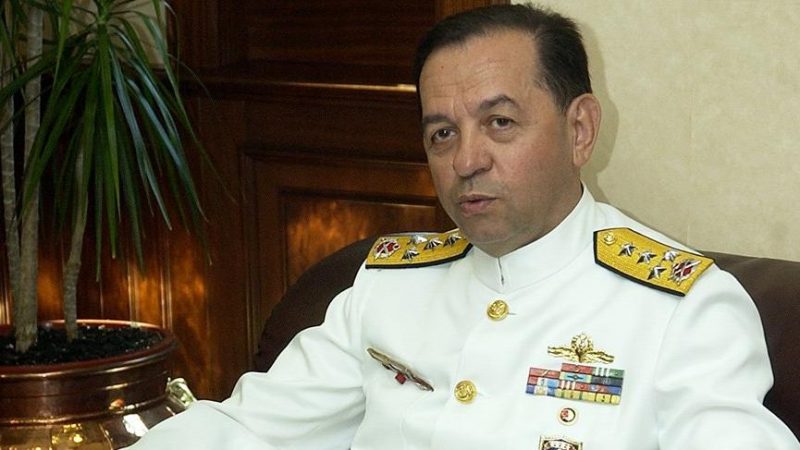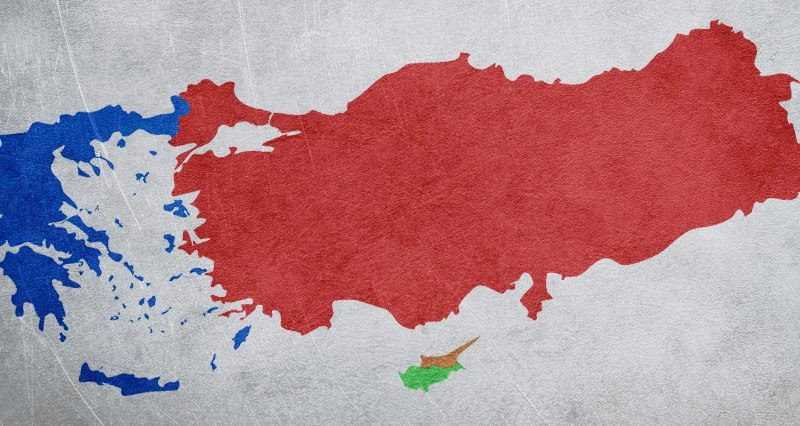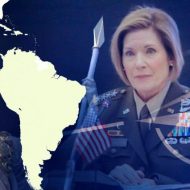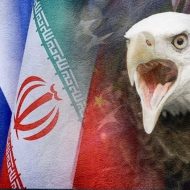“Turkey is a local (regional) superpower. It has the second most powerful armed forces after the US in NATO. Its geostrategic significance is immense. Turkey holds the key regarding the issue of refugees… Greek people believe that the Aegean Sea in its entirety is a Greek lake. Therefore, if a Turkish warship goes within 6.5 miles of an island, Greek people ask, ‘what are they doing here?’. Much of the mistakes in Greek foreign and defense policy stem from ignorance… We need to negotiate with Turkey. However, if we contemplate sitting at the table on an equal footing with Turkey, nothing can be achieved. If we believe that we will win all we want at the negotiating table, we are wrong…”
These are the words of Vice Admiral (Ret.) Antonis Antoniadis, who served as the Greek Naval Commander in Chief between 2003-2005, in an interview on the Greek news website militaire.org on February 10, 2020. Admiral Antoniadis defended his views in an interview aired on a Greek television channel in early July 2020. In a tense environment, the Admiral, who failed to meet the expectations of the program’s producers and the moderator, said the following in a very cool-headed manner, ignoring fanatic and humiliating comments against Turks: “Your question (What happens if a Turkish drill vessel appears on south of Crete?), I do not understand. You mentioned sinking a ship, but we do not have an exclusive economic zone declared for that region. Under what legal right are we to sink a ship? Turkey courts its interests and things are going very well. It does what it has to do under the framework of international law… International law has a purpose and a benefit; it is like a wall set against the most legal claims … We are more powerful than Macedonians and strong-armed them to acknowledge our position. Now, Turkey is doing it to us. All international treaties and laws have their limitations. International law has no method of enforcement, you cannot force anyone to this. There is no compelling mechanism for the implementation of international law… ”
A WISE ADMIRAL
I personally met retired Vice Admiral Antonis Antoniadis at the beginning of 2005. He was on official visit as chief of the Hellenic Navy to Turkey by invitation of the 20. Navy Commander (deceased) Admiral Ozden Örnek. At that time, I was a Rear Admiral at the Head of the Naval Forces Strategy Department. During his visit between January 24-28, 2005, I accompanied him on an official trip to Ankara, Gölcük, and Istanbul and had the opportunity to listen to his opinions and to know him closer for five days. His visit was to reciprocate Admiral Örnek’s visit to Athens in August 2004. It was fortunate for the two rational and wise commanders to meet at that time in history. Despite extremely hot issues in the Aegean, the two Admirals were able to keep their lines open to dialogue. Admiral Antoniadis was a very sincere gentleman, well-versed in universal culture, and also was an enlightened personality. His father was also a retired Admiral. Partly of Italian origin, the Admiral had clear and innovative ideas. He boldly spoke on many sensitive issues, especially religion, namely the Orthodox Christian institution and Turkish-Greek relations, which could be considered taboo in his country. He had a secular vision. He was a statesman far from utopian concepts such as Byzantium, Pan Hellenism, and Megali Idea. For this reason, I was not surprised when he was condemned by the church after his retirement years later.

His critical views about the influence of the clergymen in Greece on domestic politics and sociology were very instructive. He believed that Turkish-Greek relations, which work well on an individual basis, would also improve over time between states and governments. During his visit to Turkey, I found the opportunity to discuss with him ideas he mentioned both on the Militaire website and the TV channel the week before. I saw in those interviews that his ideas had not changed. He believed that Turks and Greeks have many common features; that the Mediterranean and 400 years of co-existence brought them closer. He brought with him a small dictionary of 700 words. When Admiral Örnek gave it to me, he said that these 700 words were of Turkish origin used in daily Greek.
PROFESSOR HRISTOS ROZAKIS
Another Greek personality who is not afraid to speak the facts is Hristos Rozakis, a Professor of Law. In an interview he gave remotely earlier this month, the following discussion takes place between him and the moderator. Moderator: “So it would be wrong to expand to 12 miles now?” Rozakis: “You have to understand that Greece does not have the capacity to declare 12 miles of territorial waters now.”On a question about Kastellorizo, Rozakis: “I think you’re obsessed with Kastellorizo. Turkey’s coastline is longer and has the right to claim a wider continental shelf. Besides, Kastellorizo is closer to the Turkish coast”. Expectantly, just two days later, the professor was dismissed from the government’s Supreme Science Council and was subjected to a lynching campaign in the media.
PROFESSOR DIMITRI KITSIKIS
Let us not forget to mention the famous Greek Turcologist, Professor Dimitri Kitsikis, a renowned theorist of a Turkish-Greek Confederation since the 1960s. He said in a TV interview in 2019: “There is no chance to solve our problems until we come to terms with the huge mistake committed against Turkey. In fact, not us, but the westerners trapped us to establish this small state in 1821 … In 1923, while we had 7 million people, Turkey had 11 million. I told you countless times that today we are 11 million and Turkey is 81 million. So, what do you expect to happen? It’s useless, we have completely collapsed – are we able to fight back?
HOPEFUL WORDS
As exemplified above, knowing the existence of wise people in our neighbor is promising for the future. In fact, the Greek media reflects the spirit of the current politics very well. In all three programs, the moderators represent the Pan-Hellenist conditioning, a kind of utopia. However, both the admiral and the two professors know the real world, as well as its Pan-Hellenist conditioning. Nonetheless, they speak the facts even if it is painful. Considering Europe’s legacy on Galileo and Bruno’s executions, it is my sincere hope that after these warning signs, these realists are not lynched in the media like Rozakis. I hope the Greek state mechanism can learn from it.
TIME TO FACE UP
Greece should face Turkey’s 21st century realities and dynamics. They should agree to sit at the negotiation table with Turkey. Although they are aware of the need to reach a compromise as opposed to claiming everything on the table, they have to accept this fact. If they do not face up to it, the responsibility for disrupting the peace environment in the Aegean and the Eastern Mediterranean will be on their shoulders. They should not expect Turkey to accept fait accompli undermining our maritime interests, while talking about the rule of international law. They may not position Kastellorizo on the 20 km coastline against Turkey’s southern coastline of 1577 km. Neither may they expand Greece’s territorial waters and continental shelf in the Aegean’s high seas in Turkey’s detriment. Maritime domain is not privileged to Greece. They may not indefinitely occupy 152 islands, islets, and rocks not ceded to Greece under agreements (EGAAYDAK). We cannot accept Greek Cypriot fait accompli far greater than their weight. They may not expect us to concede to their usurpation of 150,000 km2 of sea from our Blue Homeland.
LOCAL BALANCING POLITICS
We are living through painful times in which hegemony is changing hands; when the unipolar order is evolving into a multipolar new world order. We can demonstrate the point of US-China competition by stationing 3 American aircraft carriers in the western Pacific region for the first time since 1945. The US manipulates India against China and border skirmishes to divert China’s focus away from the South and East China Seas towards India is a balancing act (Offshore Balancing) for a hegemon power.
It is acting in a similar way in the Black Sea, the Aegean and the Eastern Mediterranean. In Eastern Mediterranean, disputes over maritime zones and the process of forming a puppet Kurdish statelet, positioning of Greece, Greek Cypriots, Israel, Egypt and France from outside the region against Turkey, who is detached from the Atlantic rhetoric; while excluding it from the imperialism’s geopolitical and energy vision in Libya, using Turkey same as a bulwark against France and Russia; to let Egypt, UAE and France run against Turkey should it cross the line… Turkey, as it transitioned from being a regional actor to a regional power, should not fall prey to such conspiracies and instead utilize its military, economic and diplomatic clout in a rational manner.
Operation Mediterranean Shield endures: protecting Turkey’s Blue Homeland
WHERE SHOULD THE CENTER OF GRAVITY BE?
Turkey opposes the hegemony’s fiction in the Eastern Mediterranean as a regional power. The strategy in this process should be an indirect approach. In the process of shaping our 21st century geopolitics, the center of gravity in the use of sea power should be the Eastern Mediterranean. Every avenue should be tested to maintain the balance set by the Lausanne Treaty in the Aegean Sea and to negotiate a solution within this framework for issues around territorial waters, airspace, continental shelf, and the status of EGAYDAAK. In this context, the issue on Eastern Aegean islands whose sovereignty was transferred to Greece under strict conditions of demilitarized status should be brought to the agenda before the UN Security Council; Turkey should officially give the islands and rocky islets in EGAYDAAK such a status.
On the other hand, Turkey’s support for the Government National of Accord (GNA) in Libya serves not only to guard our maritime zones in the Eastern Mediterranean but also to reinforce our geopolitical positioning in the Mediterranean. This positioning over Libya contributes to developing relations with North Africa and Africa in general, and rapprochement between Turkey and Italy. By having thwarted Haftar’s forces’ attempt to invade Tripoli, Turkey at least stemmed a new migrant wave to Italy.
No doubt that development of Turkish-Italian relations on solid foundations balances growing French-Egyptian animosity against Turkey in the Eastern Mediterranean. In the final analysis, it is equally important to ground relations with Russia in Libya on a format similar to the Astana process. Neither Turkey nor Russia may reach a definitive solution in Syria or Libya despite each other. The contradiction between the two would be easily used by the US for offshore balancing.
Turkey and Russia should not fall in a similar trap in the Mediterranean as India did in its relations with China. In the context of this complex and highly volatile situation, I think it is wrong to include the subject of worship in Hagia Sophia.
Before wrapping up the article, I should also draw attention to the Turkish Republic of Northern Cyprus (TRNC). Unfortunately, we see that the front concerned with national interests is scattered in the run up to Presidential elections in TRNC this October. On the other hand, the anti-Turkey Greek Cypriot affiliated political parties head for the elections with Akinci. If votes are distributed as is, the national front will be divided. If Akıncı is re-elected, the federal solution process will come back and the path will be laid leading to a similar disaster as the Annan Plan. Every step we take without the independence of TRNC in the Eastern Mediterranean is futile. Remember that our biggest geopolitical assurances to maintain the status quo in the Eastern Mediterranean are the TRNC and the Republic’s Navy.









Totally agree…
Süper!!!
I hope and wish Greece will understand our position after reading Cem Gürdeniz’s article and peace comes to Aegean Sea.Congratulation Cem Gürdeniz.